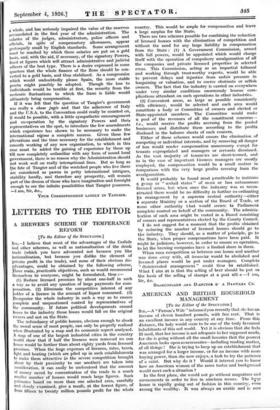LETTERS TO THE EDITOR
A BREWER'S SCHEME OF TEMPERANCE REFORM -• [To the Editor of the SPECTATOR.] believe that moat of the advantages of the Carlisle nil other schemes, as well as nationalization of the drink trade (which you have advocated not because you like nationalization, but because You dislike the element of Private profit in the trade), and none of their obvious dis- , Advantages, 'could be obtained by the following scheme, Fliree main, practicable objectives, such as would recommend themselves to everyone, might be formulated, tints :- (1) Reduce licensed premises by about one-half in such a way as to avoid any question of large payments for com- pensation. (2) Eliminate the competitive interest of any 1,1older of a licence in the anummt of liquor consumed. (3) R.eorganize the whole industry in such a way as to ensure complete and* unquestioned control by representatives of the community. If future political developments caused losses to the industry those losses would fall on the original owners and not on the State.
The redundancy of public houses, obvious enough to shock the moral sense of most people, can only be properly realized when illustrated by a map and its economic aspect analysed. 'A map of one of the largest industrial cities in the country would show that if half the licences were removed no one )iouse would be further than about eighty yards from licensed Premises. When the .huge expenses of licences, rates, taxes, light and heating (which are piled up in such establishments ito make them attractive in the severe competition brought about by their proximity to one another) are taken into Consideration, it can easily be understood that the amount of money saved by concentration of the trade in a much smaller number of houses would reach largo figures. Such ,stiniates based on more than One selected area, carefully and closely examined, give a result, at the lowest figure, of' from fifteen' to twenty million pounds profit for the wholo country. This would be ample for compensation and leave a large surplus for the State.
There are two schemes possible for combining the reduction Of licensed houses with the* elimination of competition and Without the need for any large liability in ebmpensation from the State:' (1) A Government Commission, armed with full pciwers, would be appointed which would charge itself with the operation of compulsory amalgamation of all the companies and private licensed properties in selected areas. This Commission, acting as an impartial tribunal and working through trustworthy experts, would be able to prevent delays and injustice from unfair pressure in bargaining or valuation, and to coerce obstinate or selfish Owners. The fact that the industry is carried on everywhere under very similar conditions enormously lessens com- plications 'attendant on such operations in other industries.
(2) Convenient areas, as large as possible consistently with efficiency, would be selected and each area would constitute a body or Committee of owners and elected or State-appointed members. The Committee would make a pool of the revenues of all the constituent concerns- 1:c., would receive the profits accruing from the pooled businesses and distribute them according to the profits disclosed in the balance sheets Of each concern.
Either of these schemes would ensure the elimination Of competing or individual interests, and by removing all danger of loss Would render compensation unnecessary except for tenants expropriated and managers or servants dismissed. As the vast majority of tenancies are short-termed, and as in the case of important 1 icences managers arc mostly employed, the compensation would be a small matter in eomparison With the very large profits accruing from the amalgamation.
It would probably be found most practicable to institute group or "united states" of more or less autonomous licensed* areas, but when once the industry was so recon- strueted there would be no difficulty in further co.ordinating Its nianagement by a supreme central authority—either p separate Ministry or n section of the Board Of Trade, or eome other authority that s ould secure tO Parliameni Complete control on behalf of the "conimunity. The .adminis- {ration of each area might be vested in a Board consisting Of owners and representatives elected by the County Council.
I do not suggest for a moment that the profits obtained by reducing the number of licensed houses should go to the industry. They should, as a matter of principle, go to the State, when proper compensations have been paid. It might 1?e judicious, however, in order to ensure co-operation, to kt the brewing conipanics have a limited share in them.
When once competition as between one house and another was done away with, all it-nuncio would be abolished and licensed places would be put undlx managers. Complete '` disinterested management" could thus be established. What I aim at is that the selling of beer should bo put on the basis of the sellin,g of stamps at a post ofil.e. run, Sir, &C.
SILiRMIOLI/ER o Dante-Tors o • A Boom-Ea' Co.


































 Previous page
Previous page